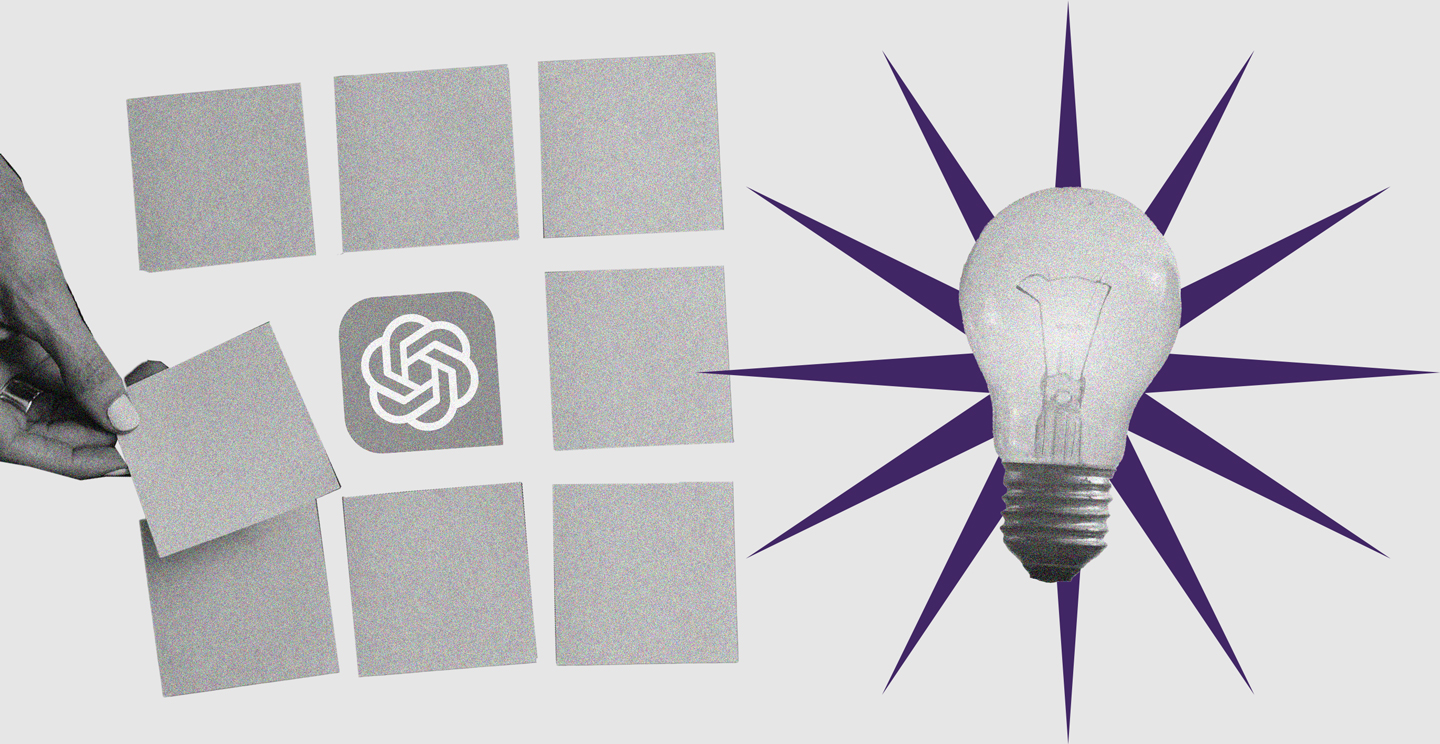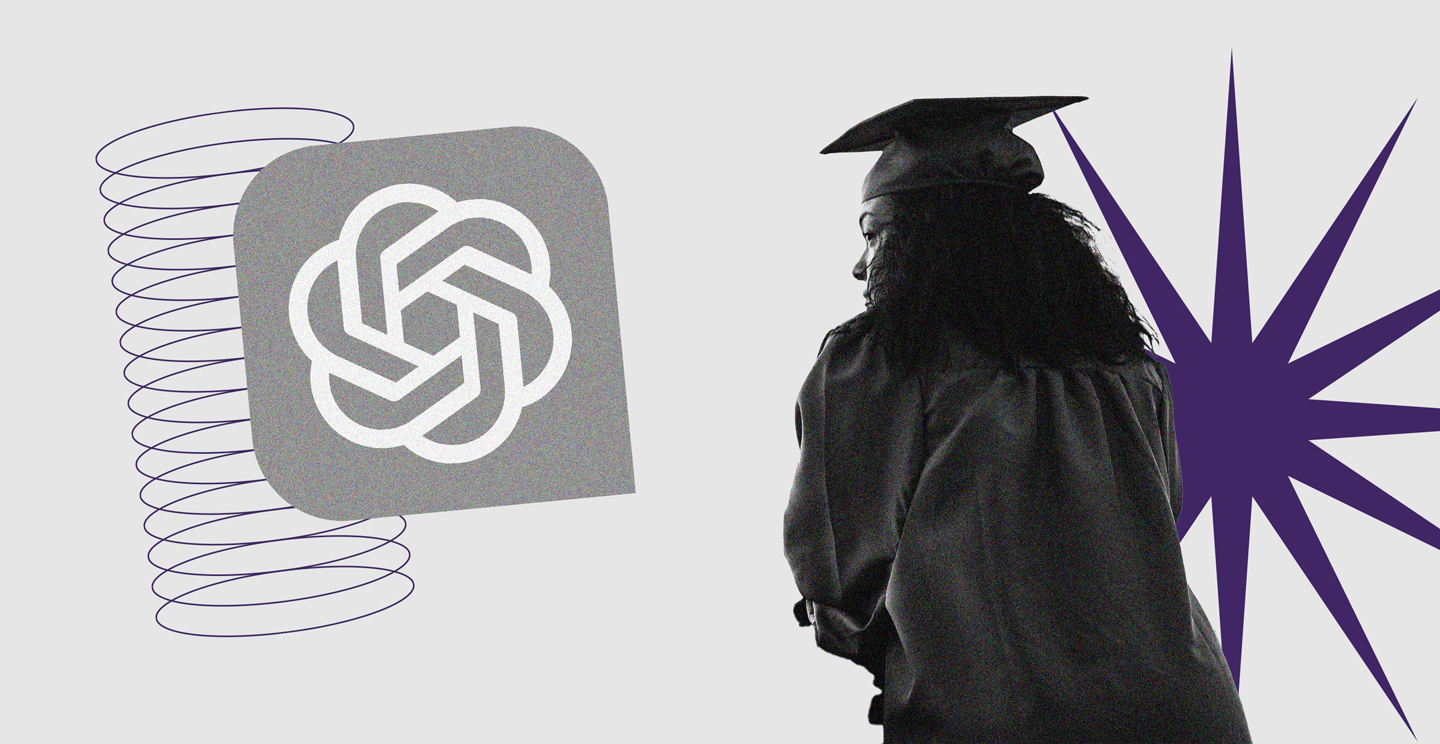Acquiring knowledge is the very definition of learning. When it happens by studying and experience, Master’s programmes are the best option in the world as we know it. But the world is changing very rapidly as artificial intelligence (AI) is going to shake many traditional models at their core.
With the launch of ChatGPT, a huge language model created by OpenAI, there has been a great deal of hypothesis about what it will mean for instruction: opportunities to learn faster clash with the risks of encouraging cheating as well as giving partial, imprecise or wrong notions (known as hallucinations) elaborated by AI.

Higher education should embrace ChatGPT and AI chatbots as a tool. Read on to learn why. Artwork courtesy of IM alumna, visual designer and artist Constanza Coscia
Although generative AI may change schooling forever, it is not plausible that ChatGPT will supplant Master’s programmes. Studies say that this AI-powered chatbot is not a threat to higher education, not only for technical reasons but also for many other (human) factors related to the way we teach and learn. And if used wisely, ChatGPT even seems to have potential as a teaching tool. Read on to find out how professors can teach with it.
Human teachers have seen things that AI wouldn’t believe, to (mis)quote Blade Runner. Learning by doing and having the opportunity to interact with an expert professional in any field is not something AI can do.
-
Humans are the primary source of knowledge
ChatGPT is an integral asset that utilises AI calculations to create human-like reactions to message-based inputs. It is a fit tool to provide general information and create insightful and logically pertinent output when asked about general knowledge and only specific topics the machine has been fed.
@csjackie Honestly.. 😩 #computerscience #chatgpt #ai #softwareengineering ♬ Make Your Own Kind Of Music - Mama Cass
Because machines are trained with human knowledge, and they are autonomous in elaborating variable and potentially infinite outputs, the “output knowledge” provided by machines needs to be checked and verified.
Nevertheless, AI is developing very fast, and it’s going to be precise and reliable in the future, making it an appealing tool for teachers wishing to offer customised growth opportunities to their students.
-
Some “human factors” are irreplaceable
Will ChatGPT ever replace the worth that comes from pursuing a Business Master’s degree? Not at all, as these courses provide a complete understanding of business models and standards that are complex environments.
They provide a certifiable learning process through a vast set of experiences, like temporary jobs, workshops, internships or school projects, which are also an opportunity to learn from experts.
More than that, these postgraduate courses are ‘backed by humans’ who offer pure knowledge and unique insights, filtering information with their sensitivity on specific topics, empowered by years of experience in the field.
In this process, not only learning is involved, but also privileged access to higher knowledge in an environment full of stimuli and inspiration. Master’s degree programmes also provide connections that are personally and professionally enriching (see point 3).
While artificial intelligence can be trained to assist students with acquiring some skills, it can’t give the fundamental level of validity of a Master’s degree.
-
AI training is a form of self-training (with its pros and cons)
Not all education can be provided on the web or through artificial intelligence. Some students do better in a real classroom environment, where they can collaborate with their friends and teachers, get clarification on certain issues and explore topics in depth.

ChatGPT will not replace the worth that comes from pursuing a Business Master’s degree. Artwork courtesy of Constanza Coscia
While web-based learning has its advantages in terms of general knowledge and accessibility to a broad range of information, it can’t replace the value of a physical study hall. This is another reason why artificial intelligence cannot completely supplant the value of traditional schooling, although the latter could continue to develop with the help of new technologies.
-
Evolving is a living being’s skill
As Charles Darwin predicted centuries ago, evolution is not something that happens overnight and is linked to the survival of the fittest.
Business MA programmes are continually evolving to meet the changing requirements of the corporate world. They are adjusting to new advancements, globalisation and changing plans of action.
This implies that Business Master’s programmes ensure that students receive the latest information and provide access to reliable, verified information from the most recent research and insights.
-
AI does not provide a degree
ChatGPT is far from totally supplanting Master’s programmes as these are certified diplomas.

ChatGPT does not provide a degree so it's far from supplanting Master’s programmes. Artwork courtesy of Constanza Coscia
In other words, ChatGPT may help students, but it cannot replace the credibility, professional value and social recognition of a Master’s degree.
-
AI can integrate Business Master’s programmes with a tailored learning approach
One potential region where ChatGPT could affect Business Master’s programmes is in the space of customised learning.
Visualizza questo post su Instagram
Artificial intelligence can offer students an opportunity for personal growth according to their learning needs and preferences. This could be particularly true in Master’s programmes in the Business field, where students come from different backgrounds and have different areas of interest and information.
If used properly and wisely, AI can empower both ends of the learning process, providing students with customised growth opportunities and helping teachers stay on top of things.
-
AI can impact how Master’s programmes are planned and conveyed
While AI is not going to replace Master’s programmes, it can be a valuable asset in developing new ways to impart knowledge, integrating systems and opening new frontier for teaching and learning.
@gianluca.mauro Do you know how ChatGPT works? I'll try to explain it in this video, in the simplest way possible. #artificialintelligence #AI #aieducation #ChatGPT #GPT4 #OpenAI ♬ original sound - Gianluca Mauro
ChatGPT provides helpful opportunities to incorporate new perspectives into the teaching and learning process, investigating information and identifying patterns.
That is why MA Business courses should not be afraid of ChatGPT, but rather consider its risks and benefits while discussing how to integrate generative AI into their educational plan and explore its true potential.
Samruddhi Harve
Fashion Business alumnus, London



